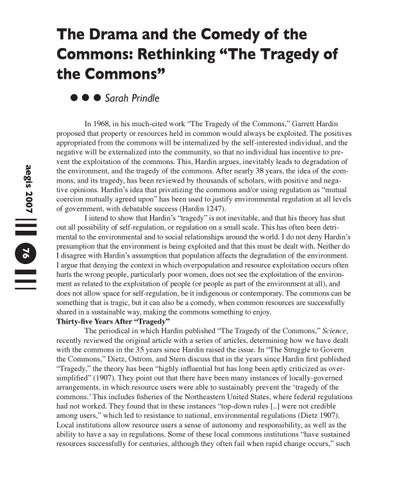The Drama and the Comedy of the Commons: Rethinking “The Tragedy of the Commons” Sarah Prindle
aegis 2007 76
In 1968, in his much-cited work “The Tragedy of the Commons,” Garrett Hardin proposed that property or resources held in common would always be exploited. The positives appropriated from the commons will be internalized by the self-interested individual, and the negative will be externalized into the community, so that no individual has incentive to prevent the exploitation of the commons. This, Hardin argues, inevitably leads to degradation of the environment, and the tragedy of the commons. After nearly 38 years, the idea of the commons, and its tragedy, has been reviewed by thousands of scholars, with positive and negative opinions. Hardin’s idea that privatizing the commons and/or using regulation as “mutual coercion mutually agreed upon” has been used to justify environmental regulation at all levels of government, with debatable success (Hardin 1247). I intend to show that Hardin’s “tragedy” is not inevitable, and that his theory has shut out all possibility of self-regulation, or regulation on a small scale. This has often been detrimental to the environmental and to social relationships around the world. I do not deny Hardin’s presumption that the environment is being exploited and that this must be dealt with. Neither do I disagree with Hardin’s assumption that population affects the degradation of the environment. I argue that denying the context in which overpopulation and resource exploitation occurs often hurts the wrong people, particularly poor women, does not see the exploitation of the environment as related to the exploitation of people (or people as part of the environment at all), and does not allow space for self-regulation, be it indigenous or contemporary. The commons can be something that is tragic, but it can also be a comedy, when common resources are successfully shared in a sustainable way, making the commons something to enjoy. Thirty-five Years After “Tragedy” The periodical in which Hardin published “The Tragedy of the Commons,” Science, recently reviewed the original article with a series of articles, determining how we have dealt with the commons in the 35 years since Hardin raised the issue. In “The Struggle to Govern the Commons,” Dietz, Ostrom, and Stern discuss that in the years since Hardin first published “Tragedy,” the theory has been “highly influential but has long been aptly criticized as oversimplified” (1907). They point out that there have been many instances of locally-governed arrangements, in which resource users were able to sustainably prevent the ‘tragedy of the commons.’ This includes fisheries of the Northeastern United States, where federal regulations had not worked. They found that in these instances “top-down rules [..] were not credible among users,” which led to resistance to national, environmental regulations (Dietz 1907). Local institutions allow resource users a sense of autonomy and responsibility, as well as the ability to have a say in regulations. Some of these local commons institutions “have sustained resources successfully for centuries, although they often fail when rapid change occurs,” such





